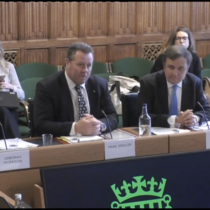UK’s largest meat companies fear drop in exports due to costly and cumbersome customs certification
In a letter to Secretary of State George Eustice, CEOs of some of the largest beef, lamb, pork and chicken processors in the UK have sent a stark warning that if the current shortage of vets in the UK persists, trade volumes of products of animal origin could drop 50-75%.
They also highlighted the hidden damage that the new customs certification process will inflict on exporters of these products regardless of whether or not we get a deal.
The group warned that the ‘New World’ from 1st January looks bleak, with British firms being put at a severe competitive disadvantage due to the new requirement to complete an Export Health Certificate for every single delivery of animal origin product to the EU.
No time to prepare
They also drew attention to the fact that, despite being told by Government to prepare for Brexit, companies cannot begin to implement new systems and IT upgrades until after 18th December. This is when the Standing Committee on Plants, Animals, Food and Feed meets to fix the details of what exactly British firms will need to comply with.
This gives companies 6 working days over the busiest week of the year to implement whatever is necessary before 1 January.
But it’s already too late to implement some of the likely requirements, an example of which is the need for testing and declarations to certify animals and processed meat are free of trichinella. This is not a current requirement so there is no system in place. This means that any animals or product currently in the system will not be cleared for export.
What the Government needs to do
In their letter to the Secretary of State the group made three calls for Government to take more decisive policy action to both increase certification resource and to use its authority to simplify the export process.
First, we want Government to instruct, and financially support, all Official Veterinarians employed (directly or indirectly) by the Food Standards Agency or other government agency to play a direct role in supporting the export certification process for products of animal origin.
By comparison, food companies in other European countries have the distinct advantage of having their export certification completed as part of the service to businesses provided by the FSA’s European counterparts.
Second, we want Government to use the authority of Animal and Plant Health Agency to significantly simplify the guidance on how official veterinarians at the last point of departure before export can rely on existing controls as the basis for having confidence to certify the products for export.
Third, we want Government to revise the rules on what inspection and verification must be done by an Official Veterinarian, and what can be done by an appropriately trained and supervised Certification Support Officer.
Unless Government now steps in with these robust interventions, we may have gone beyond the point that these issues can be fixed and a significant loss of business for the meat industry may now be inevitable.
You can read the full letter to Secretary of State George Eustice here:
Dear Secretary of State,
Urgent Action to Support the Meat Sector on Exports to the EU post-1st January 2021.
We the undersigned CEOs represent the largest meat processing companies in the UK with a combined turnover of £8.65bn and employ 46,814 people plus the NFU who have 55,000 members/producers.
We are writing to signal our urgent concern about the continued unpreparedness of the key agencies that should play a critical role in supporting England and Wales based food exporters.
As you know the UK exports over £1.6bn worth of meat to the European Union every year. Much of this trade is in cuts of meat not consumed on the home market. Without this balancing of the carcase there will be a significant impact on farmgate prices and potential home market disruption. This trade supports hundreds of thousands of jobs across England and Wales. UK to EU food exporters are facing an exponential increase in red tape to comply with EU third country rules.
The certification requirements for product to go from Great Britain to Northern Ireland with the associated costs, administration and delay will ensure an uneven, fettered UK domestic market. We understand that ultimate responsibility is on businesses to prepare to ensure they are legally compliant if they wish to continue to trade after 1st January 2021. We have already reviewed and adapted the processes of the existing supply chain arrangements to meet the massive increase in complexity and bureaucracy that our businesses will face, especially for those involving just-in-time delivery and complex arrangements, after the end of the Transition Period. However, we draw your attention to the fact that until the Standing Committee on Plants and Animals, Food and Feed (SCoPAFF) meet on the 15th December, we do not know the precise health requirements the UK will have to meet. The outcome of the same meeting will also have considerable significance about how the trade of products from Great Britain to Northern Ireland will be impacted.
We do not have unrealistic expectations about the continuation of the status quo. However, we believe that the UK Government has to play its part, not just in providing guidance and advice, but to get directly involved in supporting the process by which food achieves the necessary certification to be ready for export to the EU (or any other market).
We face a resourcing crisis. Government agencies do not have enough vets (certifying officers) to meet the exponential increase in demand that there will be across the food supply chain on the 1st January 2021 and therefore will not provide export health certification (EHC’s) for the site and products that they are supervising.
We recognise that the number of qualified Official Veterinarians (OVs) has increased from c.600 in July 2019 to c.1200 in September 2020, but there is no clarity on how many of these vets, that have undertaken the relevant training course, will actually be employed in meeting the estimated ten-fold increase in demand for export health certificates after 1st January. We do know the vast majority will not be working full time on this and will be attending to other practice duties.
We ask you to take the following actions:
- Instruct and financially support all OVs employed (directly or indirectly) by the Food Standards Agency or other government agency to play a direct role in providing export health certification for products of animal origin.
It is worth pointing out that in Scotland and Northern Ireland this is not an issue as the respective Governments and official bodies are providing this requirement at no cost. Northern Ireland is currently facilitating certification at no extra cost but Department of Agriculture Environment and Rural Affairs (DAERA) are intimating that this could change if government adopt a different devolved approach.
In addition to this anomaly across the Home Nations, this is also the case in European countries with whom we compete for export markets, as it is their Government veterinarians who supervise the process and provide EHC’s for that sites production. We cannot have a situation for our exports to be at a competitive disadvantage in relation to cost or delay in obtaining EHC’s and expect British exports of meat to succeed.
We must not allow a situation where local authority or other private sector vets are diverted to attend facilities where there are already official OVs present. Not least because it is the OV in situ who knows the facility and its processes intimately.
This resource crisis is compounded by the unnecessary, complex, and costly attestation process Government have proposed, to underpin the new certification requirements. We recognise the effort and intent behind schemes like the Group Export Facilitation Scheme (GEFS), and the prescribed use of ‘Support Health Attestations’ (SHAs), but these initiatives are too partial in effect, too complex, and ultimately too confusing, for businesses seeking to continue existing trade with EU customers.
There is a fundamental point of confidence; either the UK authorities believe that our inspection and compliance regime for food safety is robust, or it does not. This guidance on certification must be based on reliance on existing controls of Food Business Operators and commercial traceability documents, not new gold-plated requirements like SHAs for every product leaving a meat processing facility.
We ask that you:
- Use the authority of APHA to significantly simplify the guidance on how Official Veterinarians at the point of export can rely on existing controls as the basis for having confidence to certify the products for export.
If this does not happen, we expect there to be a significant reduction in the volume of meat trade to the EU (including to Ireland and Northern Ireland) in the months after the 1st January 2021. We fear that once this trade is lost it will be extremely difficult to recover.
We ask that you:
- Revise the rules on what inspection and verification must be done by an Official Veterinarian, and what can be done by an appropriately trained and supervised Certification Support Officer.
Only 100 Certification Support Officers (CSOs) have been recruited since the creation of the role over three years ago. The use of CSOs is an entirely logical way to scale up the capacity to facilitate UK exporters whilst ensuring there is supervision and control of our processes. It is incumbent on Government to provide the necessary confidence and reassurance that CSOs can play an extensive role.
We believe that alongside these three direct actions there needs to be a successful conclusion of a zero-tariff trade agreement, and a phased introduction of the export processes if the UK Government is to avert a crisis for our meat sector. We are already at a very late stage and these businesses are suffering.
We urge you to act to ensure that crucial UK businesses, jobs and trade links can take place in 2021 and beyond.
Please channel any correspondence through Nick Allen at the BMPA.
The following are signatories to the letter:
- Bob Carnell, Chief Executive Officer ABP
- Adam Couch Chief Executive Officer Cranswick PLC
- Niall Browne, Chief Executive Dunbia
- Steve Ellis, Chief Executive Officer Karro
- Chris Kirke, President Moy Park
- Andrew Cracknell, Chief Executive Officer Pilgrim’s
- Ranjit Singh, Chief Executive Officer 2 Sisters
- Terry Jones, Chief Executive National Farmers Union
- Richard Griffiths, Chief Executive British Poultry Council
- Shane Brennan, Chief Executive Cold Chain Federation
- Nick Allen, Chief Executive British Meat Processors Association





